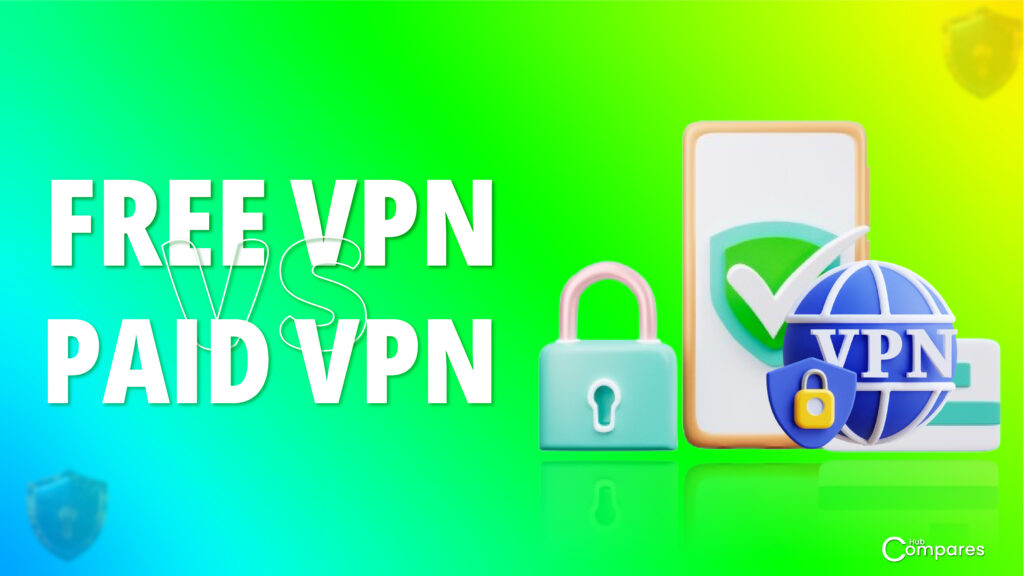So, have you ever asked yourself whether a paid VPN is worth your money or whether there are free VPNs that can do the job just as well? With more and more of our lives taking place online, and concerns about privacy at an all-time high, there has never been a more important time to choose the right VPN.
If you’re a student, a player, a telecommuter, or simply someone who wants to watch their favorite shows without limitations, VPNs are the solution for you. The big question is though: Free VPN or paid VPN?
In this article, we’ll discuss how to choose between free and paid VPNs, including the critical differences between the two options, as well as provide you with a list of the best 10 VPNs for 2025. Spoiler alert: the money you save in dollars with a free VPN might cost you in other ways.
Free VPNs vs. Paid VPNs: Key Differences:
Before diving into the best options, let’s break down how free and paid VPNs differ:
| Feature | Free VPNs | Paid VPNs |
| Security | Basic encryption, fewer protocols | Advanced encryption, multiple protocols |
| Speed | Often slower due to server congestion | High-speed servers optimized for streaming |
| Server Options | Limited servers in fewer locations | Thousands of servers worldwide |
| Streaming Unblocking | Rarely works reliably | Consistently bypasses geo-restrictions |
| Data Limits | Restricted (e.g., 500MB/month) | Unlimited |
| Privacy Policies | May track and sell user data | No-logs policies with audits |
| Customer Support | Limited or none | 24/7 live chat support |
Top 5 Free VPNs in 2025:
1. ProtonVPN:
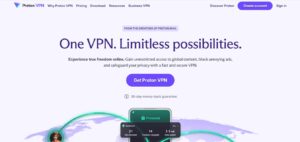
- Best For: Unlimited data + strong privacy
- Top Features: Strong encryption, zero data caps, strong Swiss privacy laws
- Cons: Free plan comes with limited server locations and slower speeds during peak hours.
2. Windscribe:

- Best For: High free data limit.
- Highlights: 10GB/month of data, integrated ad blocker + servers in 10+ locations
- Cons: Slow speeds on free servers; limited unblocking power
3. Atlas VPN:

- Best For: Users friendly for starters.
- Top Features: Lightning-fast speeds using WireGuard, SafeSwap for anonymity
- Drawbacks: Restricted server options and sporadic ads.
4. TunnelBear:

Best For: Ease of use:
- Popular Features: There is a free plan of 500MB/month, compatible apps, 256-bit encryption.
- Cons: Data cap means not recommended for heavy use
5. Hotspot Shield (Free)
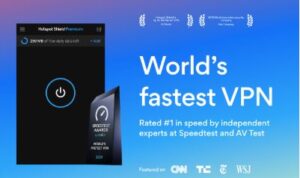
- Best For: Casual browsing.
- Features: 500MB of daily data, Catapult Hydra protocol for speed.
- Cons: Ads on the free plan, no streaming support
Top 5 Paid VPNs in 2025:
1. ExpressVPN:

- Ideal For: Performance and dependability.
- Main Features: Over 3,000 servers in 94 countries, silly mega-speed Lightway protocol.
- Pricing: From $12.95/month.
2. NordVPN:
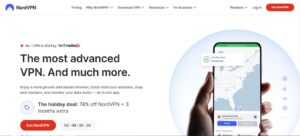
- Recommended For: Extra security features.
- Notable features: Double VPN, CyberSec (ad blocking), and over 5,400 servers worldwide
- Pricing: From $11.99/month.
3. Surfshark:
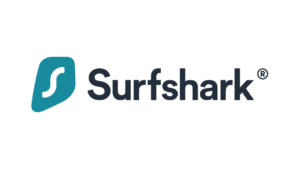
- Best For: Connecting any device for as long as you want for a small fee.
- Head of the Line: MultiHop for privacy, CleanWeb for ads, 100 countries with 3,200+ servers.
- Price: From $2.49/month.
4. CyberGhost:
- Best For: Streaming and for being user-friendly.
- Features at a Glance: Netflix and Hulu-specific servers, 9,000+ servers across 90 countries
- Pricing: From $2.11/ mo
5. ProtonVPN (Paid Plan)

- Best For: Users who are conscious about privacy.
- Its Features: Secure Core servers, No logs, Tor over VPN.
- Price: From $4.99/month.
Cons of using Free VPNs:
- And users often wonder if free VPNs are actually worth it or what exactly they’re giving up when not going for a paid version. This section will provide clarity on what using a free VPN actually means if you’ve ever been curious.
Data Logging: Most free VPNs collect (and sell) information about where you surf online to marketers. - Limited Security: Poor encryption standards can put your information at risk of breaches.
- Intrusive Ads: Models with ads can invade browsing and show malicious ads.
- Slow Speeds–Overcrowded servers throttle speeds, making them insufficient for streaming or gaming.
- Server & Bandwidth Limits: Low number of servers and data caps limit usability.
- Privacy Concerns: Free VPNs may embed trackers or malware that deplete your security.
- Limited Support: Free VPNs provide little to no customer support.
- Missing Features: Often lacking more advanced tools like kill switches and split tunneling.
FAQs About Free and Paid VPNs:
Are Free VPNs safe for my Data?
Free VPNs frequently come with fewer privacy protections and may log or sell user data to advertisers. Stick to trusted providers such as ProtonVPN or Windscribe.
Are the paid VPNs worth the price?
Paid VPNs provide better security, faster speeds, and more reliable unblocking, so they are perfect for everyday users.
What is the best VPN for streaming?
- Unblock Netflix, Hulu, and other streaming services with ExpressVPN and CyberGhost.
- Basic free VPNs do not work for streaming.
- Many free VPNs can’t unblock streaming because they don’t have enough servers or speed.
Does a VPN slow my internet down?
Yes, but premium options like NordVPN and ExpressVPN reduce this issue by providing optimized servers.
Which is the best cheap paid VPN?
Surfshark is one of the cheapest VPNs with great features, including unlimited connections.
Are VPNs legal to use?
VPNs yes are legal in most nations (not restricted/banned for a few like China, Iran).
Do I Need a VPN If I’m Not Tech-Savvy?
Absolutely! A lot of VPNs have user-friendly interfaces for beginners such as CyberGhost and TunnelBear.
What are the Disadvantages of using a free VPN?
There are some major drawbacks to free VPNs:
- Data logging: Free VPNs may sell your data to third parties.
- No or low security: For free VPNs, advanced encryption protocols may simply be unavailable.
- Intrusive ads Many free VPNs are ad-supported, which can interrupt your browsing.
- Limited speeds and servers: Many free VPNs restrict your speed and have fewer servers.
- Possible malware risks: There have been cases of free VPNs containing malware.
Is using a Free VPN harmful?
It can be, depending on the provider. Free VPNs often aren’t secure, can leak your data or harm vulnerable devices to malware. Always use a reputable free VPN like ProtonVPN or Windscribe.
Which one should I choose, Free vs. paid VPN?
Consider your needs. Free VPNs will work for day-to-day browsing, but if you want to stream, game, or have a more advanced level of privacy, a paid option is your best bet.
Which VPN has types of paid plans with a free trial?
Yes, most paid VPNs offer a money-back guarantee or free trial, so you can test them risk-free such as ExpressVPN and NordVPN.
Final Words: Free or Paid VPN: Which One Should You Go For?
Deciding whether to opt for a free or paid VPN comes down to your exact requirements. Free options such as ProtonVPN and Windscribe are fine for occasional use or dipping your toe in the water, but they usually lack the speed, variety of servers, and advanced features. In contrast, premium options like ExpressVPN and Surfshark offer best-in-class performance, security , and unlimited access to worldwide content, setting you up for long-term value.
Our Recommendation: When it comes to serious privacy, streaming, or gaming, we’d suggest going with a paid VPN to start, either Surfshark for value or ExpressVPN for speed and dependability. Free VPNs can be a temporary band-aid but might not be able to fully meet your needs in today’s demanding digital interface.


